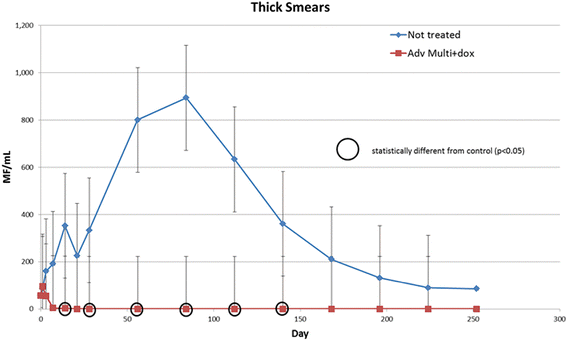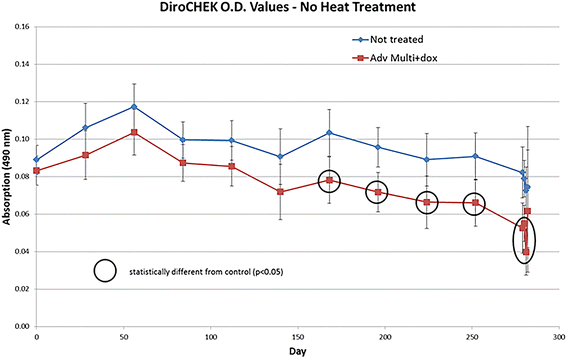Assessment of parasitological findings in heartworm-infected beagles treated with Advantage Multi® for dogs (10% imidacloprid + 2.5% moxidectin) and doxycycline
- PMID: 28526088
- PMCID: PMC5437498
- DOI: 10.1186/s13071-017-2190-9
Assessment of parasitological findings in heartworm-infected beagles treated with Advantage Multi® for dogs (10% imidacloprid + 2.5% moxidectin) and doxycycline
Abstract
Background: Anecdotal reports support the position that the adulticidal heartworm treatment utilizing doxycycline and Advantage Multi®/Advocate® for Dogs (10% imidacloprid + 2.5% moxidectin) has successfully converted antigen-positive dogs to antigen-negative. To date, no controlled experimental studies have demonstrated the adulticidal efficacy of this treatment regimen. The aim of this study was to evaluate the parasitological and clinical efficacy of Advantage Multi® for Dogs (IMD + MOX) and doxycycline in heartworm-infected beagles.
Methods: This study utilized 16 dogs, 8 dogs in each of non-treated control and treated groups. A total of 16 adult Dirofilaria immitis (Missouri strain) were surgically transplanted into the jugular vein of each study dog. The treatment regimen of monthly IMD + MOX topically (per labeled dosage and administration) for 10 months and 10 mg/kg doxycycline BID orally for 30 days was initiated 30 days post-surgical transplant. Echocardiograms, radiographs, complete blood counts, clinical chemistry profiles, heartworm antigenemia and microfilaremia were evaluated every 4 weeks. Serum samples were assayed for heartworm antigen using the DiroCHEK® heartworm antigen test. The DiroCHEK® was performed according to the manufacturer's recommendations and read using a spectrophotometer at 490 nm.
Results: All dogs tested positive for the presence of heartworm antigen post-surgical transplant and prior to treatment. Heartworm antigen levels began declining in treated dogs 3 months post-treatment. Non-treated control dogs remained antigen-positive. No microfilariae were detected in treated dogs after 21 days post-treatment. At necropsy, adult heartworms were recovered from all non-treated control dogs with a range of 10-12 adult worms/dog for an average recovery of 10.6 adult heartworms/dog. In the IMD + MOX- and doxycycline-treated dogs, the range of adult heartworms recovered was 0-2 adult worms/dog, with five dogs having no adult heartworms present. The average adult heartworm recovery was 0.6/dog in the treated group. This treatment regimen demonstrated a 95.9% efficacy in eliminating adult heartworms (P < 0.0001).
Conclusions: This study demonstrated that this treatment regimen successfully eliminated D. immitis microfilariae by 21 days post-treatment, reduced heartworm antigen concentration over time, and had a 95.9% efficacy in the elimination of mature adult heartworms. Based on this study, we conclude that this treatment regimen is a relatively quick, reliable and safe option to treat canine heartworm infection as compared to other treatment regimens involving macrocyclic lactones, when the approved drug melarsomine dihydrochloride is unavailable, contraindicated or declined by an owner unable to afford the more costly treatment or concerned about the potential side effects.
Keywords: Advantage Multi®; Advocate®; Canine heartworm disease; Dirofilaria immitis; Doxycycline; Heartworm treatment; Macrocyclic lactone treatment; Moxidectin.
Figures


Similar articles
-
Evaluation of heat-treating heartworm-positive canine serum samples during treatment with Advantage Multi® for Dogs and doxycycline.Parasit Vectors. 2018 Feb 20;11(1):98. doi: 10.1186/s13071-018-2685-z. Parasit Vectors. 2018. PMID: 29458396 Free PMC article.
-
Heat pretreatment of canine samples to evaluate efficacy of imidacloprid + moxidectin and doxycycline in heartworm treatment.Parasit Vectors. 2017 May 19;10(1):246. doi: 10.1186/s13071-017-2189-2. Parasit Vectors. 2017. PMID: 28526068 Free PMC article.
-
Efficacy of imidacloprid 10%/moxidectin 2.5% spot on (Advocate®, Advantage Multi®) and doxycycline for the treatment of natural Dirofilaria immitis infections in dogs.Vet Parasitol. 2019 Sep;273:11-16. doi: 10.1016/j.vetpar.2019.07.011. Epub 2019 Jul 27. Vet Parasitol. 2019. PMID: 31442887
-
Examination of the "susceptibility gap" in the treatment of canine heartworm infection.Parasit Vectors. 2017 Nov 9;10(Suppl 2):513. doi: 10.1186/s13071-017-2433-9. Parasit Vectors. 2017. PMID: 29143689 Free PMC article. Review.
-
The safety-net story about macrocyclic lactone heartworm preventives: a review, an update, and recommendations.Vet Parasitol. 2005 Oct 24;133(2-3):197-206. doi: 10.1016/j.vetpar.2005.04.005. Epub 2005 Apr 26. Vet Parasitol. 2005. PMID: 16198822 Review.
Cited by
-
The Fatal Case of an Autochthonous Heartworm Disease in a Dog from a Non-endemic Region of South-eastern Slovakia.Helminthologia. 2020 May 23;57(2):154-157. doi: 10.2478/helm-2020-0023. eCollection 2020 Jun 1. Helminthologia. 2020. PMID: 32518491 Free PMC article.
-
Dirofilarioses in cats: European guidelines from the ABCD on prevention and management.J Feline Med Surg. 2020 May;22(5):442-451. doi: 10.1177/1098612X20917601. J Feline Med Surg. 2020. PMID: 32326862 Free PMC article.
-
Prime detection of Dirofilaria immitis: understanding the influence of blocked antigen on heartworm test performance.Parasit Vectors. 2018 Mar 20;11(1):186. doi: 10.1186/s13071-018-2736-5. Parasit Vectors. 2018. PMID: 29554955 Free PMC article. Review.
-
Safety of Simparica Trio® (sarolaner, pyrantel, moxidectin) in heartworm-infected dogs.Parasit Vectors. 2023 Mar 31;16(1):119. doi: 10.1186/s13071-023-05700-9. Parasit Vectors. 2023. PMID: 37004097 Free PMC article.
-
Efficacy of oral, topical and extended-release injectable formulations of moxidectin combined with doxycycline in Dirofilaria immitis naturally infected dogs.Parasit Vectors. 2023 Feb 6;16(1):54. doi: 10.1186/s13071-023-05673-9. Parasit Vectors. 2023. PMID: 36740705 Free PMC article.
References
-
- Bazzocchi C, Mortarino M, Grandi G, Kramer LH, Genchi C, Bandi C, et al. Combined ivermectin and doxycycline treatment has microfilaricidal and adulticidal activity against Dirofilaria immitis in experimentally infected dogs. Int J Parasitol. 2008;38(12):1401–10. doi: 10.1016/j.ijpara.2008.03.002. - DOI - PubMed
-
- American Heartworm Society . Current Canine Guidelines for the Prevention, Diagnosis, and Management of Heartworms (Dirofilaria immitis) Infection in Dogs. 2014.
MeSH terms
Substances
LinkOut - more resources
Full Text Sources
Other Literature Sources

